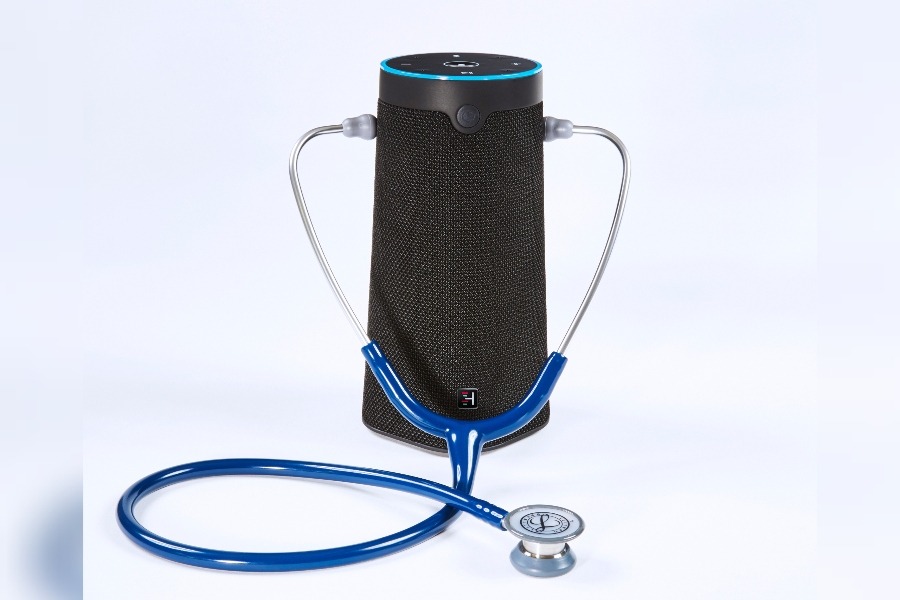NextUp: This New Voice Assistant Tells You When to Take Your Meds
Move over, Siri and Alexa. WellBe is here to take the virtual assistant market to new heights with at-home healthcare support.

WellBe is a home device that provides voice-commanded health support. / Courtesy
“NextUp” is a weekly NextHealth PHL feature that highlights the local leaders, organizations and research shaping the Greater Philadelphia region’s life sciences ecosystem. Email qmuse@phillymag.com with pitches for NextUp.
Who: HandsFree Health is the parent company of WellBe, a voice-controlled virtual assistant that allows consumers to manage their health from home.
The company was founded in 2016 by two experienced healthcare leaders, Dan Messina and Mike Cardillo. Messina has over 35 years of healthcare experience, having previously served as the chief financial officer of Aetna Health and the chief executive officer of Magellan Health, once the largest employee assistance program and independent behavioral health provider in the world. Cardillo has over 40 years of experience in healthcare. He previously served as the president of Aetna Health and the co-president of U.S. Healthcare, a Pennsylvania-based health insurer, which Aetna absorbed in 1996.
In 2001, Cardillo co-founded and Messina signed on to help lead Health Advocate, a Pennsylvania healthcare advocacy and assistance company that amassed more than 40 million members before it was sold in 2014 for $265 million. Within a year and a half of the sale, both Messina and Cardillo had retired with plans of getting some long-awaited rest and relaxation.
It wasn’t long before Cardillo had another business idea brewing—he wanted to create a voice recognition service specifically for healthcare. Cardillo shared the idea with Messina and the duo decided to come out of retirement to launch a device that they believe will empower health consumers and help solve some of the lingering issues in the healthcare industry.
“The voice recognition space is a very exciting space to bring healthcare to,” Cardillo told NextHealth PHL. “We believe consumers want to take more responsibility for their healthcare. So, we’re providing the tools to empower them so that they engage in the healthcare system more and become smarter consumers.”
HandsFree Health is currently housed in a temporary office space in Wayne, and the company’s founders are in the process of securing a permanent space for their 15 employees. They anticipate they’ll double their workforce in the next year to support mass marketing and continued development of WellBe, the company’s flagship device.
“We think voice recognition is the way of the future and we think that healthcare is something that needs to be done at home,” Messina said. “The burden is being placed more and more on the consumer to figure out their healthcare needs. So, why not have a device that can provide all of the above to individuals in the comfort of their own home?”
What: Much like the popular Amazon Echo, Alexa, Google Home, or Siri, WellBe is a voice-assisted device that is designed to respond to simple commands. What makes WellBe unique is that it has HIPAA-compliant security features and is primarily dedicated to the healthcare market.
The device listens only after it hears the wake-up command, “Ok WellBe.” WellBe can be programmed onsite or remotely via an app to remind loved ones to take medicine, make or keep doctor’s appointments, or order prescription refills.
WellBe also provides authoritative health facts. Users can ask and get answers to a wide range of health-related questions from, “What time am I supposed to take my medication?” to “How much does a knee replacement cost in zip code 19112?”
The device can be programmed to recognize up to six family-members’ voices and will display a different colored light for each family member. The colored light system can also be programmed to correspond with specific task reminders. A red light, for example, could tell a user that it’s time to head to a doctor’s appointment, while a green light could be programmed to indicate the time to take medication. Cardillo believes one of WellBe’s critical advantages is that it can be programmed to require verbal confirmation once a health task has been completed.
“In addition to a series of personalized services, WellBe has medication management to alert individuals when they should be taking their prescriptions,” Cardillo explained. “Especially important for seniors, there’s a non-compliance alert to their loved ones should they not be taking their medications and there are all types of reminders relating to flu shots, blood pressure readings, and cholesterol checks.”
Though WellBe is focused on healthcare, it can also be directed to play music and audiobooks, among other entertainment features. WellBe has been through beta testing and the founders estimate the product will be available for sale to the public, nationwide, by the end of April 2020.
Other products in the HandsFree Health pipeline: a medical life alert watch that Cardillo envisions will be the new and improved solution to the infamous “I’m falling and I can’t get up” device; and, in the distant future, using artificial intelligence to decipher a person’s voice, determine their mood and offer advice on how to improve their wellbeing by suggesting a simple remedy like eating a meal or taking a nap. The company also sees telemedicine as a natural evolution for WellBe.
“We hope to maybe someday get to the point where there’s an actual screen on WellBe that would include the ability to see the doctor from home if you have a medical need,” Cardillo said.
When: In 2019, Cardillo won a 2019 Digital Innovator award for his work on WellBe. The award recognizes individuals who are leading the digital transformation of the human resources and benefits industry.
Also, in 2019, HandsFree Health demonstrated the company’s artificial intelligence integration for the healthcare market during the Microsoft BUILD Conference, an annual event aimed at software engineers and web developers.
Why: HandsFree Health wants to help seniors maintain their independence by helping them manage their healthcare at home. The company’s founders know how burdensome it can be for caregivers to juggle managing their own health on top of someone else’s—an increasingly common reality as many Americans rely on loved ones to help them remain at home, remain independent, or simply remain safe. But the specific needs of seniors and caregivers tend to be overlooked by most health management tools. WellBe is designed to meet those needs by providing a product that more and more consumers are clamoring for: voice-assisted technology.
A recent report from market forecast analysts at Juniper Research found that an estimated 8 billion digital voice assistants will be in use worldwide by 2023, up from 2.5 billion assistants in use at the end of 2018.
What It Means: With the creation of WellBe, HandsFree Health is positioned to take a notable piece of the voice assistant market. The founders have decades of healthcare experience under their belt and innovative ideas in the wings that could help take artificial intelligence for healthcare and telehealth to a new level.


